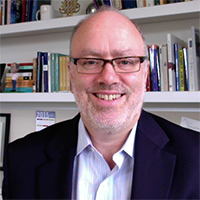 We asked Professor Robert Gibbs about his course: We find out what its aims are, who should take it, and how uncovering meaning is a collaborative endeavour.
We asked Professor Robert Gibbs about his course: We find out what its aims are, who should take it, and how uncovering meaning is a collaborative endeavour.
DSR: Can you describe RLG202H1S “Judaism” for us in a nutshell?
RG: This course doesn’t presuppose that students are familiar with Jewish traditions or the academic study of religion, nor do they need a background in any faith practice. The course is an introduction to the religious tradition of the Jews that explores key themes as they’ve changed from ancient times to today. A specific theme will frame the focus each year, and these include the Sabbath, Place, Household and Power. This year the theme is Study. For each theme, we read holy texts, modern literature, history, ethnography and philosophy, in a range of genres and across the diverse span of Jewish experience.
I am interested in thinking about the Jewish religious tradition in a wide variety of disciplines and approaching it from a range of perspectives: it gives a different understanding of what religion might be.
DSR: So this isn’t about what Jews believe?
RG: Not specifically, no. Nor is it mostly about their religious practices. In Judaism, the thing most important to belief and to practice is study. It’s a culture of learning and teaching. Indeed, over time, there is the potential that studying the religious laws becomes equal to the keeping of the laws themselves.
DSR: Are the preservation of the Jewish religion and the assimilation of new ideas in opposition?
RG: In fact, Judaism has been transported and translated continuously. While it's a tradition that has suffered a great deal of persecution and exile it also has been reborn – so there isn't something that is the ‘true eternal’ culturally speaking or even religiously speaking. It is always changing and appropriating new languages, new cultures, new ways of practising, and new ways of studying as well.
DSR: The course is focused on study. What can that tell us about Judaism?
RG: Study is really important for this appropriation and transformation, and also for transmission of tradition. The reading and rereading of the earliest texts and the repetitions and reinterpretations of the tradition is constitutive of how it works. A central premise of Judaism is that as a community there has to be an ongoing work of study. That is really a kind of searching for the meaning not only of tradition but of meaning in a larger sense: what it means to be human, to be in a community, to be responsible for others, what it means to be in a relationship with God.
Since it is, after all, students who are studying in RLG202, there is a parallel at work here. What we’re looking at through the lens of Judaism is the sense in which the study of religion goes in both directions: it is both the object of study and also in one sense what makes religion religion.
DSR: The Jewish tradition of studying in twos and threes will be employed in your class. Tell us more about that.
RG: This is an opportunity to participate in and examine the kind of inquiry, energy, creativity and attention to the past that is involved in the search for meaning. It is the activity of looking and seeking together. The texts themselves can be conflicting and confusing, and are often reports of other people's disagreements and their troubles trying to understand something. What is being studied is the process that other people studying are engaged in, so this is about how to learn together, how to look for meaning together. This approach considers that meaning comes from the disciplined work of interpreting and thinking – and talking – with other people about texts. There is also an interesting dynamic at play between the oral teaching and the written teaching.
DSR: What kind of student would you recommend this course for?
RG: Students from the sciences and the humanities alike! While interpretation and the search for meaning are integral to the humanities, this course not only covers a wide range of texts but you get to work with one or two other people to discover how the texts portray and make meaning. For those from a science-based discipline, group work is more common – that’s how a lab works, after all – but the kinds of questions we’ll be asking are different from what they’ll be used to. There aren’t right answers to open-ended questions. The challenge is ambiguity – that which can be explored but not solved. However, while there isn’t necessarily a resolution, looking for meaning is far from haphazard: there is rigour in the process and learning how to do that, and how to ask questions, in a different kind of area is a valuable skill.


